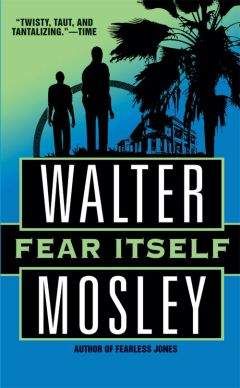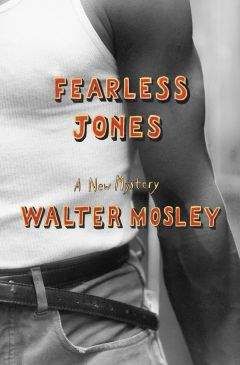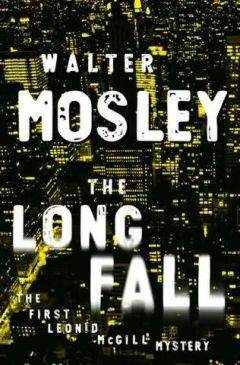Walter Mosley - The Last Days of Ptolemy Grey
“You must’a been a mess when you were a young man, Mr. Grey.”
“No. Not me. When I was younger I couldn’t take three steps without trippin’. I was quiet and shy, couldn’t put my words together for love or money.”
“What happened to make you like you are today?”
I sold my body to the Devil, he thought.
But he said, “Some people just come into focus wit’ age, I guess.”
“Would you like me to bring you over some fudge tomorrow?”
“Please do.”
“Noon?”
“Sounds like a date to me.”
In his room that night Ptolemy cleaned and loaded his pistol. Hilly had put the bullets in with half a can of salted peanuts and so he had to use a chamois cloth to wipe off each cartridge. He enjoyed this process. It made him feel that he was getting ready for some great event. He remembered how it felt on D-Day, when the Allies stormed the Germans in their French strongholds. He was an American that day. He stood side by side with tens of thousands of men, and even though he didn’t die for his country, he felt a part of something big.
And now, loading his pistol, he was a soldier again, at war again, ready to lay down and die for an idea that was so powerful that it didn’t seem to matter that it was based on a lie.
That night Ptolemy fell asleep for the first time since the plain-faced European nurse had given him his last shot of the Devil’s medicine. He dreamed about normal things, like the bus ride and Mossa’s lovely flower garden. At one point in his dreaming he was standing in front of a mirror, watching as he grew older. At first he was a child in a light-blue suit that his mother had sewn. The sleeves and pant legs were too short because he had outgrown the dimensions before his mother could finish the job. Then he was a young man, a soldier, an ice deliveryman, and an orange-suited civil servant, cleaning anything from sewers to demolition sites, from municipal buildings to the downtown train station. He wore a black tuxedo for his first wedding, and a white jacket with black pants for his second. Both suits were still in his closet, cut for a bigger frame than the shrunken old man he finally saw in the glass.
He was withered and naked, with a small fire blazing in his chest. The fire had been loaned to him by Satan, an errant angel who coveted men’s souls.
Gazing deeply into the fire, he could see his first childhood love, Maude Petit, running around in the blaze looking for succor, for Li’l Pea to save her. He reached out into the reflection and lifted the child from her torment. He placed her on a high shelf and blew on her to extinguish the flames and heal her cracked skin. Then with his hands he covered the fire raging in his breast and the heat began to rise.
Now that he knew that Maude was safe, Ptolemy reveled in the flames that Satan had given him. The fire grew in the small space of his chest. It went from yellow to red to white-hot intensity. Ptolemy felt the heat coming from Maude and knew that he had saved her somehow by reaching into Hell itself and rescuing her. The flames were licking the back of his throat, leaping up behind his eyes, but he didn’t awaken. Maude was safe at last, after eighty-six years of torment in Ptolemy’s memory. He had saved her, put her out of harm’s way. He had swallowed the flames that burned her, and that made him crazy with joy.
He opened his eyes to find himself writhing in his fevered bed. He was now in the burning house that consumed the Petit family. His body was that house, the attic of his mind aglow.
He went to the bureau and opened the green glass bottle. He’d placed a small juice glass filled with water by its side. He held the pill a moment before putting it in his mouth and drinking. He smiled as he swallowed, feeling as close to heaven as he ever had in life before. Somewhere the choir of his church was singing, cheering him on.
The medicine was fast acting. Ptolemy’s fever began to lower in less than five minutes. As his skin cooled and the fire abated, Ptolemy the old man sat at the foot of the big bed that Sensia had made him buy so many years past.
We need a big bed, baby, she’d told him. A bed big enough to hold all the love I’ma give ya.
“I almost threw it all away, Sensie,” Ptolemy told the memory. “I almost failed at my duty. A man only got to do one thing to set him apart. A man only got to do one thing right.”
Ptolemy realized that the fever wasn’t fully gone, that the medicine was losing the battle against the fire in his mind. He climbed up on the bed and slept on top of the covers. He was a child again and Maude and he were playing down by the Tickle River and nobody else, not even she, knew that she had ever died.
Robyn got up early and left. She’d put a note on the small table in the kitchen telling Ptolemy that she’d be out all day. At the bottom of the note was the number to a new cell phone that she’d purchased.
Ptolemy knew what cell phones were. Little radios that acted like phones. This knowledge burned in his mind, wavering, shining brightly. He knew that in some way this understanding in his ancient brain was some sort of abomination. He knew that the Devil would have his due. But that was further up along the trail. He picked up the house phone and dialed a number automatically without even having to recall it.
“Hello?” the heavy voice of Hilly answered.
“Hey, boy.”
“You get my peanut can, Papa Grey?”
“Yeah, I got it. But tell me sumpin’.”
“What’s that?”
“Why you wanna leave live ammunition out in the open where any child or fool could pick it up?”
“I knocked but you wasn’t there,” Hilly complained.
“You could’a called. You could’a taken the peanut can back home and called me and come ovah when I told you to.”
The young brute sighed through the line.
“That don’t make sense to you, boy?” Ptolemy asked.
“I know what you sayin’,” he countered.
“You do?”
“Yeah,” Hilly said. “But I didn’t wanna waste my time comin’ all the way ovah there again. You wanted the bullets and now you got ’em. I don’t see why you raggin’ on me.”
Ptolemy thought about what his great-grandnephew was saying. But it was as if they spoke different languages and came from different peoples far removed from each other by thousands and thousands of miles and many generations. Hilliard was a Catholic and Ptolemy a Hindu, or something else far removed from what his nephew believed in. He tried to think of how he could explain the great expanse of separation to the boy, but even the Devil’s injections had not made him that smart.
“You got Nina’s phone number somewhere around there?” Ptolemy asked after giving up on the young black man.
A familiar man’s voice came across the line. “Hello.”
“That you, Alfred?” Ptolemy asked.
“Who’s this?”
“Ptolemy.”
“Who?”
“The man Reggie used to look aftah. The one you met at Niecie’s house when you took Reggie’s wife away.”
“What you sayin’, man?” Alfred asked angrily.
“I’m sayin’, is Nina there?”
A few seconds passed before the receiver banged down and Alfred called out, “You bettah tell that mothahfuckah to be respectful.”
“Hello?” a feminine voice asked. “Who is this?”
“Ptolemy Grey . . . Reggie’s great-uncle.”
“Oh . . . Mr. Grey. Why you callin’?”
“I’m fine and how are you?”
“Oh, okay. Uh ...”
“How was the funeral?” Ptolemy asked, trying to repair the broken conversation.
“Very sad, Mr. Grey. The children were so sad. Reggie’s sistah come down from Oakland with her kids. What is it you wanted?”
“Did you bring Alfred to the funeral?”
“No . . . how can I help you, Mr. Grey?”
“I got everything I want,” he replied. “I don’t need a thing, thank you very much.”
“But why are you callin’ here?” she asked, beginning to lose patience.
“That Robyn is a miracle,” he said. “You know that?”
“She okay.”
“No . . . no, no, no. She’s a honest-to-God miracle.”
“I got to go, Mr. Grey.”
“When she come here to my house,” Ptolemy said, as if he had not heard Nina’s complaint, “she saw the mess and the junk and cleaned it all up from one end to the other. Washed and cleaned and threw out and poisoned the bugs too. And then, when she looked at me and seen that I was a mess, she took me to the doctor and got me the kinda medicine you people got out there today. Strong stuff, the kinda penicillin open up your eyes.”
“That’s, that’s wonderful,” Nina said. “You go, Mr. Grey.”
“Get off the phone with that old fool,” Alfred said in the background.
“I got to be somewhere, Mr. Grey.”
“So you know,” the old man went on, “when Robyn brung me to that doctor, that handsome Devil with the thick mustaches, I started to remembah things.”
“That’s nice but I—”
“One thing I just remembered was somethin’ Reggie wanted me to give you.”
“I said get off that phone!” Alfred shouted.
“Just gimme a minute, Al. I’ll be off in just a few minutes.”
“I’ma go wit’out you, Nine,” he threatened.
“Go on, then,” she said. “Go on an’ I’ll meet you there.”
Errant sounds came through the line for a time. This period was ended by a loud bang that Ptolemy thought was a door slamming.
“Mr. Grey? Are you still there?”
“Sure am. I hope I didn’t cause any trouble with your man.”
“Don’t worry ’bout him. He just get mad sometimes.”
Suddenly, and without apparent reason, Ptolemy had a startling memory. It was an afternoon that Reggie was visiting with him. It was back in the time when his mind wasn’t working right, but still he had a clear image of the young man showing him a photograph.
“These my kids, Papa Grey,” the old man remembered the young man saying. “Tish an’ Artie. Aren’t they beautiful?”
“Mr. Grey?” Nina was saying. “Are you there?”
“I don’t want that man’a yours to know about this,” he said.
“Okay. I won’t tell him. What is it? What did Reggie have for me?”
“I wanted him to have it,” Ptolemy said. “But he said that he wanted it for you and them beautiful chirren. Are the kids still stayin’ wit’ Niecie?”
“For a while longer,” Nina said. “Until I get myself together.”
“Uh-huh. You go and visit them?”
“On Tuesdays and Wednesdays, every week. Those are my days off from the department store.”
“Hm. That’s good. A mother should see her kids. They need to be seen by her. That way they know they okay. They know it by the look in her eye. You know, if your mother look at you an’ smile, then you know you doin’ all right.”
“What was it that you had for Artie and Letisha?” Nina asked softly.
“I don’t want that Alfred to know nuthin’ about it,” Ptolemy said again. “Reggie didn’t like him.”
“I won’t tell.”
“Okay, okay, then I’ll tell you what. One day I’ma come by Niecie house when you there with the kids but Alfred ain’t. That way I can talk to you without worryin’ about him hearin’ it.”
“But what is it?”
“I’ll tell you that when I see you.”
“Why don’t you tell me now?”
“I would if I could but I cain’t ’cause I ain’t.”
“Why not?”
“You just make sure to go to Niecie’s on Tuesdays and Wednesdays. What time you usually go there?”
“’Bout eleven in the mornin’.”
“Keep that up and you will get Reggie’s gift.”
“But, Mr. Grey, I need to know what it is.”
Ptolemy hung up the phone and grinned. He chuckled to himself and then laughed out loud.
Sitting in the living room in the late morning, Ptolemy tried to remember the last time he laughed out loud. He could feel the laughter in his hands and knees. The happiness had replaced his arthritic pain. He never laughed like that when he was with Sensia. She laughed for him. He was already beyond elation and wonder by the time he was a man. It was way back in his childhood, when he would walk around the woods with Coydog and the old thief made crazy faces and sounds and told jokes about things that other adults didn’t think were proper.
Ptolemy wondered how he could have lived for so long but still the most important moments of his life were back when he was a child with Coy McCann walking at his side. How could the most important moments of his life be Coy’s last dance on fire and Maude’s death in flames? Hadn’t he lived through poverty, war, and old age? Didn’t any of that mean anything?
The Devil’s fire ignited in him and he was able to laugh again now that he was burning alive.
He thought about Robyn’s legs, about how firm and brown and strong they were. Many a time, when she was walking around the house in only a T-shirt, he wanted to get on his knees and hug those powerful thighs to his cheek and chest. This desire made him happy. He was as old as Methuselah but a child’s legs made him happy. He could no longer feel sex, but he remembered . . . maybe knowing it better in hindsight than he ever did when he was able.
“I love her,” he said into the silence of the apartment.
As the moments passed, Ptolemy thought about stars wheeling through the night sky. They moved past, getting on with their business while men had their feet in clay.
We born dyin’, Coydog used to say sometimes. But you ask a man an’ he talk like he gonna live forevah. Nevah take no chances. Nevah look up or down.
“I love you, Robyn,” Ptolemy said as a reply to words spoken so long ago. Death was coming, but Love was there too. Robyn was a far-off descendant, an adopted child, a woman he might have loved as a woman if he were fifty years younger and she twenty years older.
Pain tittered in his knucklebones and burbled in his knees. His joints were like music, like transistor radios calling out from under his skin. The knock at the door was a new strain, another musician deciding to jam with him. He waited for the knock to come again before getting up, going to the bedroom, pulling the bureau drawer open, and retrieving his .25-caliber pistol.
He walked to the door purposefully, like a soldier marching into battle.
“Who is it?” he asked in a mild voice.
“Shirley Wring,” she answered sweetly.
Changing his mood as quickly as an infant child distracted by a sudden sound, Ptolemy stuffed the little gun into his pocket, threw the four locks, and opened the door.
She wore an orange dress and largish, bone-colored beads. Her half-blind eyes glistened behind glittering glasses. Her short hair was done recently, forming a cap that wrapped in arcs down under her ears and got curly over her forehead. Her tennis shoes were white and sensible. And instead of the red bag, she carried a pink paper box in her hands.



